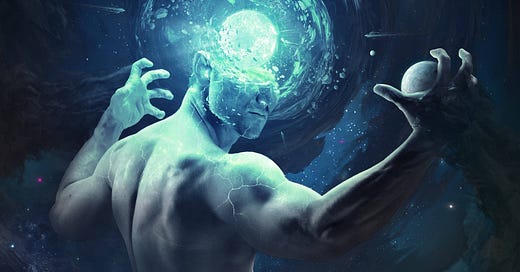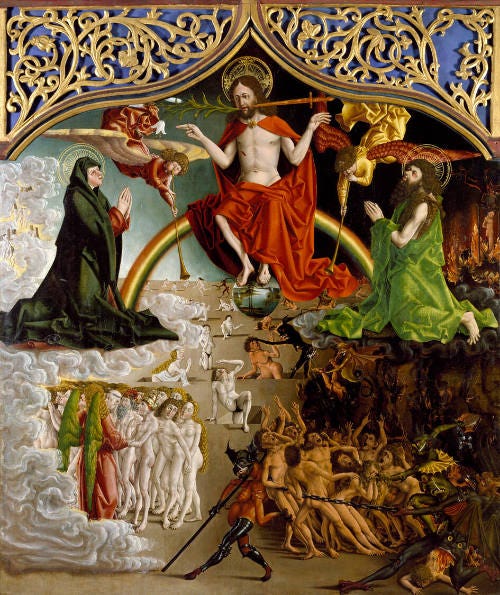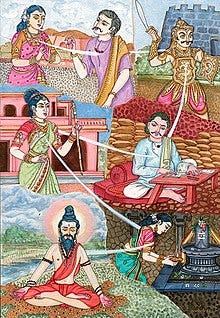Though the various religious Traditions of man differ from each other on an institutional level, they spring ultimately from the same primordial divine source. Thus theologians differ, but the mystics of each Tradition are all in accord with each other. This is, broadly speaking, the philosophy of The Sophia Perennis that we espouse on this newsletter, and to have direct experience within our hearts of that One Divinity behind all revealed religions is one of our goals as is fit for any wise sentient being. But whenever one thinks about Perennialism, there are certain specific issues of seeming contradiction between the Traditions that beg to be resolved from a speculative standpoint. One of the issues that Perennialists tend to hand-waive, and which Sectarians love to mention in attempting to discredit Perennialism, is the difference between the Abrahamic belief in Resurrection at the End of History and the Dharmic belief in Reincarnation within Cyclical Time. We think those who believe this is an essential element of contradiction simply lack spiritual insight and philosophical imagination. What follows is a reconcilement of these two ideas, of Reincarnation with Resurrection, that will lead to an enrichment of our understanding of Dharma, Abrahamism, and Perennialism. But before we discuss how these can be reconciled, we will outline and contrast these two belief systems.
The religions of Judaism, Islam, and Christianity are the three main branches that spring from the Abrahamic root. While these Traditions outwardly differ in certain decisive respects, it has always made sense to categorize these together in juxtaposition with other religions. What they have in common and what seemingly sets them apart from other religious Traditions is the idea that The Supreme and Universal Transcendent Creator God has a Salvific Plan that works itself out in History, and that believing in this deity and trusting His plan (i.e. Faith) is a moral good-in-and-of-itself. We see all of this in the foundational Abrahamic text, The Book of Genesis. God creates the Universe through His Speech and says that it is good. So the universe is not a product of the wills of multiple competing supernatural beings as it is in the more superstitious types of Paganism, but rather the whole universe is the result of the will of one Transcendent Being who is guiding history towards specific ends. God chooses a particular and peculiar man, Abraham, to play a decisive role in His Plain wherein “all families of the Earth will be blessed” (Genesis 12:3). Abraham trusts in this plan no matter what, he trusts in it more than he trusts any normal human moral intuition or any empirical fact, and for this he is richly rewarded. All Abrahamists find their spiritual origin in this one man, Abraham, who is uniquely empowered by God to be the progenitor of a new religious outlook that has dominated the Earth in the last 2,000 years. Though this idea wasn’t developed further until later on, eventually the Abrahamists all came to believe that at the end of history all humans who have ever lived will be literally physically resurrected, and then judged by God to spend an eternity with Him in Heaven or apart from Him in Hell.
This linear history model of Abrahamism was later secularized and became the spiritually lethal philosophical systems of Hegelianism, Marxism, Progressivism, etc. wherein the “End of History” is a utopia brought about through human means which these revolutionists think all of history necessarily lead up to. All these secularizing philosophies idolatrously regard History itself as God, forgetting that it is God who acts through History and not the other way around. Though the linear model of History from Abrahamism has degenerated in our time, it’s important to remember that in its original form this model of history involves the decisive action of God in History through divine intervention rather than the actions of humans through socio-political revolution. Though ideas that have their ultimate origin in Abrahamism are dangerous to the spiritual life of the world, this is not in itself a refutation of Abrahamism, indeed it is just proof of the power of believing that history has a mysterious redemptive meaning in-and-of-itself that we can participate in during the present moment. Rightly understood, this idea can still empower us in a spiritually efficacious manner today.
While as Perennialists we believe that all genuine religions have truth in them, we do not think that they are all equal. Christianity is the most true Abrahamism and the best of the Abrahamisms. Thus, we do not consider Christianity an “offshoot” of Judaism but rather Christianity is the true continuation of the biblical Kingdom of Israel’s religion, the truest direct fulfillment of Abraham’s faith, whereas Judaism1 and Islam2 are degenerative offshoots of these.
Abrahamism emerged in a world where most people believed in the Dharmic belief of Reincarnation or Metempsychosis. Though we have already talked about Reincarnation and the role that Race has in it previously in depth, we will discuss it in brief here. All Indo-European cultures subscribed to this belief, and it has its most sophisticated expression among the Vedic Aryans of yore whose writings ultimately became the source of Hinduism, Buddhism, Sikhism, Jainism, and other religions. The dramatic rise of Abrahamism in the last 2,000+ years has made it easy to forget that belief in reincarnation is actually the norm in human history3. The Ancient Greeks, Egyptians, Celts, and Germanics all subscribed to the reincarnation belief system as they were, in their own unique ethnic ways, practitioners of the Indo-European belief in Dharma. In this system, our eternal spirits incarnate into different physical bodies depending on the sum of their thoughts, words, and deeds (Karma) in previous lives. To be born as an animal means that one acted like an animal in a previous life, and after one’s karma for being born as an animal has exhausted itself one can again incarnate as a human. The more fortunate one’s life circumstances are as a human means the better one’s karma is from previous lives. Those with the very best karma of all can even incarnate as a powerful lesser deity, and the very worst karma means one incarnates as a demon who is tortured in Hell. So in the reincarnational system, there is still room for Heavens and Hells, but these are transient. Once the Karma that enabled a spirit to take birth in the realm of the gods has exhausted itself, that spirit must incarnate again in the realm of humans and cease to enjoy the pleasures of Heaven. Likewise, whatever terrible Karma resulted in a spirit being born in the realm of the demons will eventually be expiated through the torments of Hell and that spirit can again incarnate as a human, essentially being given a blank slate with the chance to do good deeds again.
Thus, your eternal spirit has already incarnated within numerous bodies that have come and gone and lived out various lifetimes. Perhaps you have already been through many heavens and hells. Each time your spirit incarnates it passes through a veil of forgetfulness that results in it having very little or no recollection at all of its myriads of past incarnations. A powerful enlightened spirit has a degree of freedom in what to incarnate as, and may have spent considerable time in the spiritual world in-between reincarnations coming up with a plan to enact here on Earth or being told lessons to learn here by Divine beings or perhaps you were given a specific mission. The point of reincarnation belief systems is not to attain a good incarnation, as a quintessential component of all belief in reincarnation is that one must cease reincarnating. Once a spirit has attained a sufficiently high degree of spiritual enlightenment and learned all of the lessons that one must learn, the spirit ceases to reincarnate and enters into an Eternal Heaven wherein one will not descend from. Thus in this type of belief system, there are both transient and eternal heavens, with the latter being more desirable in the eyes of the wise and more spiritual.
Embedded within this reincarnational model of Dharma is the concept of cyclical time. Each world, and the entire universe itself, passes through cycles of time called Yugas. We all agree that we are currently in the darkest Yuga, the Kali-Yuga, but that this materialistic and ignorant time will one day pass and make way for a new resplendent and enlightened yuga called The Satya Yuga. That Golden Age to come will one day pass too as did the ancient Golden Ages in times of yore, however, and a new Kali-Yuga will come. Thus in the Dharmic view there is no “end of history” and the spiritual telos of the aspirant is not to prepare for an end of history but rather to escape this cyclical history by transcending this world altogether.
One final point on the Dharmic view is that our Spirits are eternal rather than immortal. To say something is immortal is to say that it has a beginning but does not have an end. To say something is Eternal is to say that it is beginningless and endless too. While the eternality of our spirits is very mysterious, essentially our spirits were with God from eternities past and then descended into this material world. To walk the spiritual path is to strive to return to Him.
The Abrahamic view of History is linear, with a clear beginning when God created the universe and a clear end on The Last Judgment at the End of History which follows the General Resurrection. The Dharmic view of History is cyclical seemingly with no strict beginning or end. If a spirit must reincarnate, how can it resurrect? Which of the myriad bodies it has passed through would it resurrect from? The difficulty of these questions has lead sectarians to dismiss Perennialism and it has lead Perennialists to usually just assert that Abrahamists have the wrong model of the afterlife altogether. The overwhelming majority of Perennialists side with the Dharmic idea of reincarnation and will say that the Abrahamic Religions actually do teach Reincarnation just as the Dharmic Traditions but that they do this esoterically. Indeed, the amount of mystics from the Abrahamic Traditions that suggest implicitly or even explicitly that Reincarnation is the real spiritual truth is astounding. Perennialists say the founders of Abrahamism and those in the upper mystical levels of these Traditions told a Noble Lie when they said that reincarnation isn’t real though they knew it is as they were concerned that the masses wouldn’t take their spiritual lives seriously if they knew they had an infinite amount of chances, essentially, to realize the truth, and so they had to be scared into taking the spiritual life seriously with the threat of eternal hell after only one life of having a chance. It makes sense that Perennialists would come to this conclusion, since the Vedic idea that different deities are just manifestations of the same ultimate reality can easily be used to appropriate non-Dharmic religions, and Sanatana Dharma ultimately is in many ways closer to the original religion practiced in the Golden Age of the ancient past. But I believe that by examining how a Resurrection could play out in a Reincarnation belief system we will wind up enriching our spiritual understanding as well as having a greater insight into the nature of both the Abrahamic and Dharmic Traditions.
—
Keep reading with a 7-day free trial
Subscribe to SCYTHIAN BRO to keep reading this post and get 7 days of free access to the full post archives.





